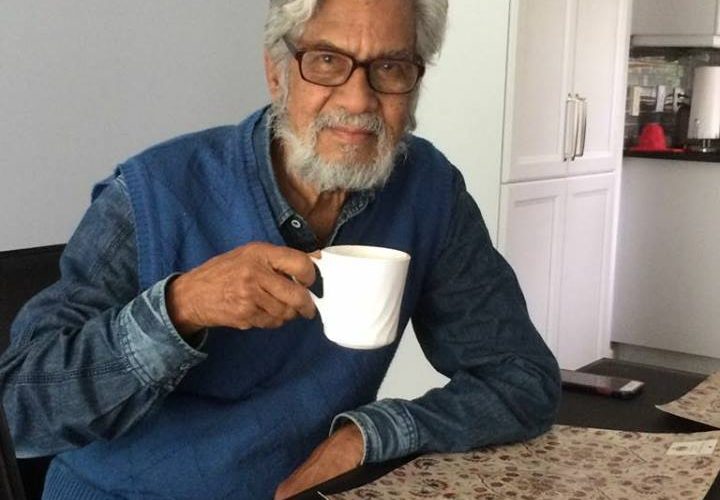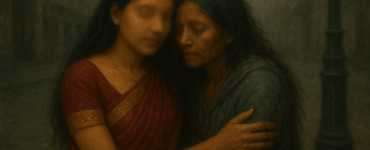Telugu: Kavana Sarma
***
Krishna is my adopted son. Whenever I look at him, I am reminded of people who refuse to change with changing times. Life has a parallel with a boat adrift in a stream. It is always easy to run with the course than against it. Man’s resources come next to nothing if he were to swim against the tide. He cannot even stay put at any place enamored of the beauty of its surrounds; for, he would get tired soon and cannot run his course later. Time sweeps him off to its desired shores. So do the people, who stick to their customs oblivious of the changing times. When time beats them down, they resign themselves to their fate and do not make even a semblance of attempt to steer their life in proper direction. Just as a careless driver jeopardizes the lives of other users of road, society suffers from these ‘resigned-to-fate’ people.
Suseela, Raghu, Satyanarayana and Subba Rao may disagree with my opinion. They all attempted to swim against the currents of time, failed and were exhausted. Poor fellow Krishna, son of Suseela and Raghu, had become an unfortunate victim.
I had personal relationship with all the five. To be honest, I had even fancied once that I loved Suseela (Susi). Now she is no more. I never told my wife about it because she would not believe my statement that I did not love Susi as easily as she would believe if I had said that I loved Susi. Men should rather keep certain matters to themselves than tell their wives honestly and expect them to believe them. If I had really told her, I firmly believe, she would have searched for a motive behind my adopting Krishna and all the love and affection she bore towards him might have vanished into thin air.
Susi was not a beauty by any stretch of imagination. She was like any other girl in her teens with charms of youth unfolding when I first saw her. It was not for her beauty that I loved her or thought I did. In fact, I had a different opinion about what normally passes off for beauty. It seems that I might have entertained the idea of loving her for some time. Maybe, now I am loving the idea that love was a myth. Afterall, I am entitled to my prejudices like any other human being.
We hailed from the same place which was neither a village nor a town. It was smaller than the smallest town and larger than the largest village. Susi was the daughter of Satyanarayana, a landlord living opposite to our house. He used to relish his leisure in an easy chair in their verandah making enquiries about all the villagers from the passers-by.
My father was a small pensioner and we lived in a modest accommodation. Susi used to frequent our house to play with my sister Suguna. Like all lucky brothers having sisters, I had an opportunity to love my sister’s friend. Whenever my sister asked me to pluck a guava for Susi, I felt as if I were riding an elephant. Whenever she looked at me thankfully with widened eyes and the pleasure of biting a guava, I was disturbed. I started adoring her and presumed she also did. When I was changing from shorts to trousers, I fancied I was really in love with her.
Susi moved very closely with every member of our family. I was telling myself that all her makeup and attire was only to attract me. When Suguna and Susi were in ninth class, they had a difference of opinion on matters of religion and tradition. As I was already imagining Susi to be my wife, I admired her love for tradition and branded Suguna and her supporters as heretics for their liberal views. I did not realize, then, that tradition was never static and that it had changed earlier, and it would change in future as well, adapting itself to changing times. Her father did not realize this all through his life. As I never went beyond the contours of our rural town until I joined Medicine at Visakhapatnam, my mother was my role-model of tradition.
In the summer of my passing second year of Medicine, Suguna and Susi passed their Secondary School Certificate Examination. Suguna joined Pre-University Course. When asked about her future plans, Susi replied, “I’ll spend my time learning domestic chores. Neither can I sit, nor my father would approve of my sitting unabashedly among so many boys in the class.”
The answer hurt me because my sister was in that ‘unabashed’ lot. But I comforted myself with the selfish idea that this girl, sequestered within the four walls of her home, would give me conjugal happiness unlike the medico girls who moved freely with boys with abandon. It never occurred to me that her ideas were not her own or that she had no ability to think on her own. I did not even realize that her talking to me could be termed as ‘unabashed.’ Even if I did, perhaps, I thought she endorsed my self-assessment as the only boy of character.
My outlook underwent a drastic change the following year. It dawned upon me that girls don’t attend colleges just to lose their character and that a child could get spoiled even within the confines of its home. So I encouraged my sister Suguna to join Medicine after her Pre-University course.
I was not surprised when Susi’s father asked Suguna, “What? Does your father expect you to join service?” for, I entertained similar views till few days before.
I noticed Susi avoiding us whenever we went home for holidays ever since. Once I met her in a temple and asked what the matter was. She replied, “Nobody will come forward to marry me if I were to be seen in your sister’s company.”
“Why should you fear? Am I not here to marry you?”
“You? Marry me? Why should I marry you? My father tells me that you medical students have no morals and freely flirt with nurses.”
I was exasperated and thought that only God could save her from such prejudiced opinions.
It was rather her father than herself that should be blamed for such queer ideas. Looking at her large eyes widening further as she spoke to me, I realized for the first time that it was more a reflexive action with her than any special affection towards me. Her reply deeply hurt me. However, I felt a great relief that a great burden was off my shoulders. Until then I thought it was my duty to marry her and would be doing a great injustice to her if I didn’t. I was also happy for my prudence of not making public my intention of marrying her.
Sometime later, I heard that her father was looking for a suitable alliance for her. With her average complexion and moderate education, demand for dowry had escalated. With a large part of his property used up to support his idle style of living, the demand was beyond his reach. All the same, his ego prevented him from settling for a match he could now afford.
Gradually, I gave up the idea of loving her. More so, after seeing many love marriages fail. In the heat of youth, couples ignore the shortcomings of their spouse in the beginning. Slowly, the molehills become mountains and conflicts and incompatibilities surface leading ultimately to the wreckage of marriage. As such, I left the choice of my bride to my parents.
Suguna’s marriage was performed simultaneously with mine. Susi told somebody that her father was in no hurry to marry her off to some Tom, Dick and Harry! That person carried the news to us. Sometime later, one of his well-wishers advised Susi’s father to allow her to take up some employment till a suitable alliance could be found. It would serve as a pastime for her and at the same time she could support the family. Enraged at the suggestion, Susi’s father cut him short saying, “I don’t expect to live on my daughter’s earnings. You are not welcome to my house if you are to raise the matter again.” Therefore, the matter was never raised again.
Susi was twenty when I secured a government job and left our place. After frequent transfers for twelve years, I managed to get a transfer to my in-laws’ place, Kakinada. Though we were childless, my wife Varalakshmi refused my intervention as a doctor. She was feeling lonely and I thought she might find some solace among her folk. That was the reason why I got a transfer to Kakinada. Once in a while, my wife used to suggest my remarriage for the sake of children, which I never consented to even inadvertently. Having known the perils of such a decision, I once said, “Let us wait till He blesses us!” and the glow in her eyes betrayed the level of conviction behind her suggestion.
It was in Kakinada that I met Raghu. We shared the same room and dined in the same mess as Medicos. Cleanliness was an obsession to the point of fault with him. Finding me amidst my books and cigarette butts, he used to comment that I was like a bovine in its pen. I used to protest that I was the cleanest among all my people. He used to laugh and say, “ Either your people must be having great affection for you, or, they must me more…. than you. Well, forget about it. Let us settle for the former.”
It was not his nature to hurt others. He used to re-arrange things to order in my room. I always considered myself lucky to have by my side, my mother in my childhood and Raghu during college days. Varalakshmi took their place after marriage. That is why all the three are so dear to me.
Against such a docile person as Raghu, his father Subbarao was a complete contrast. He was a tiger to him. Even his letters scared Raghu. Raghu married a girl approved by his father before completing his studies.
I enquired about his welfare when I met him in Kakinada. He replied:
“You know my father. I remained where I am because of him. Even India might prosper under Congress rule, but not my house under my father! It’s all my fate!”
The perceptible change in Raghu was that he did not even dare to be this critical of his father earlier. I always wondered why Raghu, with such education and employment, could not organize his life to his liking. He did not like offending his father. Obeying his instructions was his ethic.
I went to his house once on some errand. I met his father there for the first time. During the one-sided conversation, his father used phrases like ‘If it were my days’, ‘When I was of Raghu’s age’, and ‘If I were Raghu’ several times. He could not realize that neither he was Raghu, nor were the times his. But he gave me no chance to put it across to him. He put ethereal customs and conventions on the same pedestal as the perennial values of life and preferred to swim against the current. For me Truth is like a stoical mountain. Customs are like pebbles that roll down from it with the stream of times.
From what Raghu told me, I understood this:
Raghu loved to dine with his wife. But his father expected her to dine only after he and Raghu had finished their dinner. Raghu expected his wife to be social, but thanks to his parents, she had no time for that. Raghu wanted to plan his family, but his wife refused to interfere with the ‘Will of God.’ Her mother-in-law convinced her not to take any medicine just because her doctor husband had given it. I became a ready example that God did not bless everybody with children. He wanted his wife to accompany to movies; She would rather have her mother-in-law. She would not be seen for the whole day, but only at night in fine white attire decking flowers in her plaits almost when he was on the verge of falling asleep. Not that they imposed any restrictions or put her to any hardships. She became a slave by volition to the idea of obedience to in-laws. She was not in a position to realize what she was depriving herself of. Raghu was aware of it. But he was in turn a slave to the same idea. Raghu’s wife was at ease as she did not find any conflict between what her parents had taught and what her in-laws demanded from her. It did not occur to her that she and her husband were a generation apart, and her husband’s views need not be in tune with his father’s. Therefore, the house looked a heaven for others while it was a veritable to hell to him. He started showing his disgust. Tired of her ways, he resigned himself to the inevitable.
I visited Raghu’s house again after a year or so. Raghu was not at home. When I enquired about him, his wife said, “It was long since he was at home on Sundays and holidays.” I overheard her father-in-law reprimanding her for that answer. She retorted, “What’s wrong with my reply?” Shortly afterwards, Subbarao came out and invited me into his room.
“Raghu has changed a lot these days,” he said as I was taking my seat. “Of late, he is infatuated with a woman in Pithapuram and goes there whenever he finds time. He doesn’t care me anymore. He doesn’t even answer my queries. His wife picks up a quarrel when he comes home. Don’t you think it is her duty to bring him back to the right path? If she picks up a quarrel every time he comes home, won’t he drift away from her further? We can neither control nor correct him at this age. He will stay at home only when he could find some peace of mind. My daughter-in-law has also changed. She is not the same obedient soul that she once used to be. Of course, we cannot expect her to treat us differently from him. Bad days have befallen us. It’s all our fate.” He poured out his woes before me.
I could see the fatigue on his face. People who fail to act at the right time always blame their fate later on. The old man never thought of the fate until Raghu found outside what he missed at home. I assured him that I would do all I could to convince Raghu.
Few days later I invited Raghu to my house for a cup of coffee. I broached the topic. “If you find something wrong with your people, what you should be doing…”
Raghu intercepted and said, “Do you think they change? I tried two or three times. Nobody cared for me, not even my wife. With the support of her in-laws, she neglected me. She was cold to me when I was warm to her. She wants to cling to me because someone else wants me. My father considers dining at the table a crime as serious as stealing. Those are the aberrations of the incorrigible. I suffered as long as I could. But now, no more. I feel vanquished.”
“But is it meet for a gentleman like you to run an affair with a woman in Pithapuram?” I accosted.
“So, it has come up to you! They think that woman is my keep. No. I married her. “
“You are a government servant. Don’t you know that you could be dismissed for bigamy?”
“It is not applicable to Muslims in India. I was a Muslim when I married her!” Raghu laughed it away.
I was surprised. I am a layman in the finer aspects of law.
“Further, if you come to know who she is, you will not look down upon her as others do,” Raghu continued.
“Who is she?” I asked curiously.
“Suseela. Daughter of one Mr. Satyanarayana. She hails from your place. Looking at our college photo she immediately identified you.”
I was shocked to hear Raghu’s second wife was Susi. How could this be? That too when his first wife was still alive. I wondered how her father had consented to the proposal. Unable to contain my curiosity I asked Raghu to narrate the whole story.
“I wanted to tell you this story myself. I know nobody understands me better than you. Some two to three years back I was posted to your town. I was their family doctor. She used to keep her house spic and span. You know my weakness for cleanliness. I used to visit them more often than was necessary. Nobody mistook my visits because of my reputation. Those days I held no more than a mere liking for her. I found a parallel between our lives. Our parents did all the thinking and took all the decisions on our behalf. We simply followed them. We are birds of same feather! Right? But I could not understand why she did not get married till thirty. I never imagined that she would be my wife two years later. Her only concern in life was her father, as her mother had expired a year or so before. Later I got a transfer to Kakinada.
“Last year she brought her father in a serious condition to Kakinada. By coincidence I was on duty that day. She lost her father but got me. With the death of her father, Susi had neither job, nor any property worth falling back upon, nor the protection of a male. She burst into tears. I don’t know why but I wanted to reassure her of my protection and hugged her.
“As I could be of some help if she stayed close by, I asked her if she could stay in Pithapuram. She readily agreed. I disposed of whatever little property she had at her place and bought a house in Pithapuram. I felt proud when she looked so adoringly at me with her wide eyes. Within a year I married her. As her background was not known, people think low of her. Please call on her whenever you find time.”
I could not find it until after another month. Her house was in ship-shape condition. That did not surprise me. What actually surprised me was her make up. She turned so ultra-modern.
Like a pendulum drawn to one end, people possessing extreme views can only oscillate to the other extreme; people with moderate views oscillate less. Their margin of swing in the opposite direction is too small. Any East-Godavari person would have held an unfavorable opinion seeing her in that ultra-modern make up. And the neighborhood she lived in was such. Susi started crying on seeing me. Later she recounted her version of the story.
She was deceiving herself believing her father’s views were hers. She envied Suguna for her opportunity to study further and pined at her own inability. Her father’s views cast such a spell on her that she did not even realize it. Unable to appreciate the change in values, she thought that values have not changed.
“When you proposed to me, I deceived myself believing that I did not love you for fear of my father’s disapproval as our castes are different. Do you know the reason for his ill health? His inability to give me a decent education and marry me off. The realization dawned too late on him and he breathed his last with this worry and fear. Within an hour of my father’s death, I lost myself in the first warmest embrace of my life when Raghu took me in his arms to console me. Right then and there, I decided to flow with the dictates of youth whatever be the consequences rather than resisting it. I even shunned the thought I was being unfair to his first wife. I did not want to waste whatever little was left of my youth with the dialectics of good and bad,” concluded Susi.
The following year, Suseela gave birth to a male child, Krishna. Raghu was very happy. But, Susi got restive as she wanted her son to be recognized as a legitimate child and placed on par with Raghu’s other children. She wanted society to recognize her as Raghu’s legal wife and not as his ‘minor-wife’. To that end, she was prepared to serve her in-laws and his first wife. Raghu’s first wife was adamant.
Thus, Raghu’s momentary heaven had reduced to veritable two-fold hell. Susi was not prepared to let go the straw Raghu to swim across the stream of life to safer shores. Raghu’s first wife did not bother about Susi in the interest of her children and her own.
Society started looking down upon Susi’s son as out-of-wedlock. She could not tolerate this humiliation. By committing suicide, she wrote the epilogue of her life of brief happiness.
Raghu’s life became miserable after her death. He could not admit his son in a destitute home. Nor could he take him to his household. He then remembered us, the childless couple. He requested to adopt his son. We agreed. The process of adoption was in strict accordance with legal procedure, lest there should be ticklish issues later. Varalakshmi was happy that her prayers were answered at last. She no longer required her parents’ moral support. Kakinada did not suit Krishna. So I got a transfer to a far-off place.
***
Telugu Original: Eduriita, Andhra Patrika Weekly, 22.10.1971)









good story and translation done justice to it. ThanQ